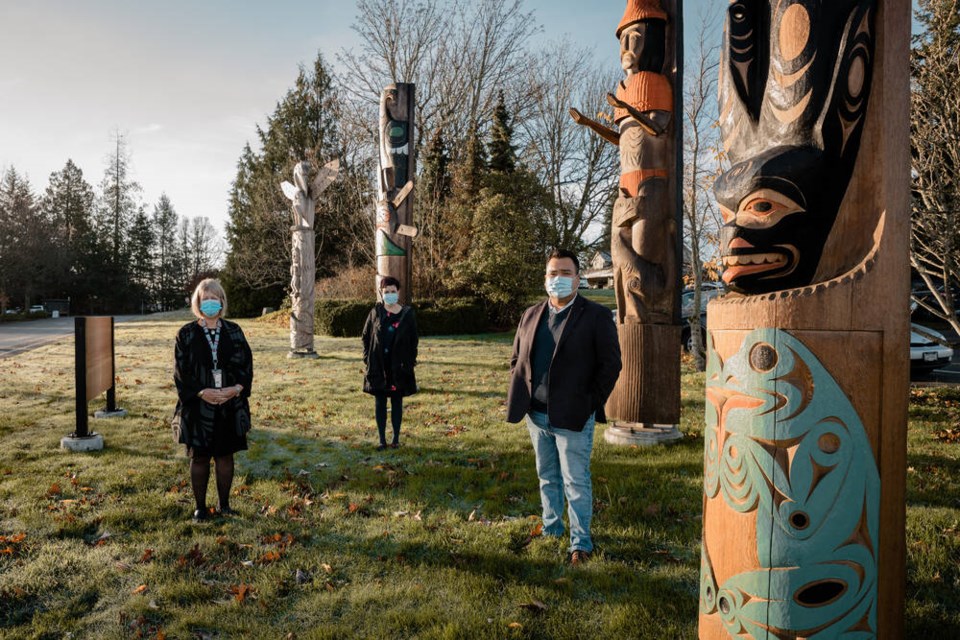Island Health says it has already implemented reforms in some of its hospitals in response to an independent review that found widespread Indigenous-specific racism across B.C.’s health care system.
Saanich Peninsula Hospital, for example, will hire a liaison to advocate for Indigenous patients, and improve its cultural sensitivity training, said Island Health CEO Kathy MacNeil during a press conference at the hospital Tuesday morning.
The hospital will allow Indigenous patients to have a designated visitor, MacNeil said, as the health authority understands that the policy restricting visitors during the pandemic has been painful for people. New employees will also be asked questions about cultural safety during interviews.
MacNeil acknowledged that systemic racism exists in B.C.’s health care system and apologized to all Indigenous patients and health care staff who have been subjected to painful treatment.
“We’ve been absent in our actions when there has been acts of racism that have occurred against patients, families and employees, and for that I am very sorry,” she said.
Island Health is committed to implementing all of the recommendations made by Mary Ellen Turpel-Lafond in her report, MacNeil said.
Turpel-Lafond, B.C.’s former child and youth watchdog, was asked in June to investigate allegations that health-care professionals played a “game” to guess Indigenous patients’ blood alcohol levels. Her report, released Monday, found no evidence to substantiate the allegations, but detailed hundreds of other examples of racism, prejudice and profiling in B.C.’s health care system.
The health authority will also conduct a more detailed review of the case of Cpl. Connor Sutton, one of the cases detailed in the report. Sutton, a member of the T’Sou-ke Nation and a Canadian Armed Forces member, was denied care after seeking medical help for severe pain due to a hole in his esophagus in June.
Sutton was discharged from Cowichan District Hospital after one night, then returned when his pain persisted. He was refused care and told to find a homeless shelter. His father drove him the next day to Royal Jubilee Hospital, where he was transferred from the cardiac unit to the psychiatric ward. His family is still struggling to access the medical files that might explain why Sutton was placed in the psychiatric ICU.
“We want to understand where we may have gone wrong there and what decisions we made that influenced the care trajectory that he had in order to be accountable to him and his family and to improve our systems so that doesn’t happen again,” MacNeil said.
Tsartlip First Nation Chief Don Tom said he is pleased with the work already carried out by Island Health to make Indigenous people feel safe when they access emergency health care.
“Right now is a critical time for Indigenous people to access health care,” he said, referring to the global pandemic and rising COVID-19 cases on Vancouver Island.
Tom said the he was not surprised by the report because he’s heard from members of the Tsartlip First Nation who have faced painful racial stereotypes when going to an emergency room.
The report makes several recommendations, including that the province work with Indigenous communities to improve patient complaint processes to address Indigenous-specific racism. It also recommends new cultural safety and humility training for health care workers, a system to recruit Indigenous people into leadership positions in health care, and creating a school of Indigenous medicine at the University of British Columbia.
The B.C. Association of Aboriginal Friendship Centres has partnered with Safespace Networks to promote a website that allows Indigenous patients to report health system concerns anonymously. Safespace Networks is a community-led, nationwide initiative to create change in the health care system by holding individuals, organizations and institutions accountable to addressing racism.
Leslie Varley, the association’s executive director, said Turpel-Lafond’s report highlights that the existing processes for monitoring and addressing racism in health care serve mainly to defend health care institutions.
“Safespace Networks will help our people define their own quality of care by providing a culturally safe and accessible way for their concerns to be heard,” Varley said in a statement. People can report their experiences at safespace.healthcare/bcaafc.
Turpel-Lafond said the investigation panel will keep its tip line and tip email open for future complaints. To report a specific story of racism in the B.C. health care system, call 1-888-600-3078 or email addressing_racism@gov.bc.ca
kderosa@timescolonist.com



